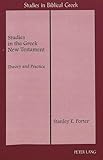Studies in the Greek New Testament : theory and practice / Stanley E. Porter.
Material type: TextSeries: Studies in Biblical Greek ; v. 6.Publication details: New York : Peter Lang, c1996.Description: vi, 290 p. ; 23 cmISBN:
TextSeries: Studies in Biblical Greek ; v. 6.Publication details: New York : Peter Lang, c1996.Description: vi, 290 p. ; 23 cmISBN: - 0820428582 (hardcover : alk. paper)
- PA817 .P67 1996
 Book
Book
| Current library | Collection | Call number | Copy number | Status | Barcode | |
|---|---|---|---|---|---|---|
| Joshua & Timothy School of Theology Library (JTSOT) General Circulation | Non-fiction | PA817 .P67 1996 (Browse shelf(Opens below)) | 1 | Available | 028021 | |
| Nairobi Campus General Circulation | Non-fiction | PA817 .P67 1996 (Browse shelf(Opens below)) | 2 | Available | 028022 |
Includes bibliographical references and indexes.
Ch. 1. Greek Language and Linguistics -- Ch. 2. In Defense of Verbal Aspect -- Ch. 3. Tense Terminology and Greek Language Study: A Linguistic Re-Evaluation -- Ch. 4. Linguistic Issues in New Testament Lexicography -- Ch. 5. The Greek of the New Testament as a Disputed Area of Research -- Ch. 6. Vague Verbs, Periphrastics, and Matthew 16:19 -- Ch. 7. "In the Vicinity of Jericho": Luke 18:35 in the Light of its Synoptic Parallels -- Ch. 8. Did Jesus Ever Teach in Greek? A Look at Scholarly Opinion and the Evidence -- Ch. 9. Thucydides 1.22.1 and Speeches in Acts: Is There a Thucydidean View? -- Ch. 10. [actual symbol not reproducible] in Ancient Greek Literature and Romans 5: A Study of Pauline Usage -- Ch. 11. The Argument of Romans 5: Can a Rhetorical Question Make a Difference? -- Ch. 12. Wittgenstein's Classes of Utterances and Pauline Ethical Texts: A Study of Galatians 3:28-29 in Context -- Ch. 13. What Does it Mean to be "Saved by Childbirth" (1 Timothy 2:15)?
Studies in the Greek New Testament: Theory and Practice is a collection of essays illustrating the relevance of Greek for understanding the New Testament. The essays, combining theory and practice, grow out of the author's abiding concern for the study of Greek utilizing the best insights of modern linguistics and biblical exegesis. The first part of the volume, devoted to theory, concentrates on fundamental linguistic questions.
Although grammar is emphasized in these essays, including the topic of verbal aspect, lexicography is also discussed. The second part of the volume, devoted to practice, contains essays on crucial passages such as Matthew 16:19, Luke 18:35 and its parallels, Mark 15:2 and the language of Jesus, the speeches in Acts, Romans 5, Galatians 3:28-29, and 1 Timothy 2:15. In these chapters, the author defends provocative positions by utilizing close study of the Greek text.
There are no comments on this title.
